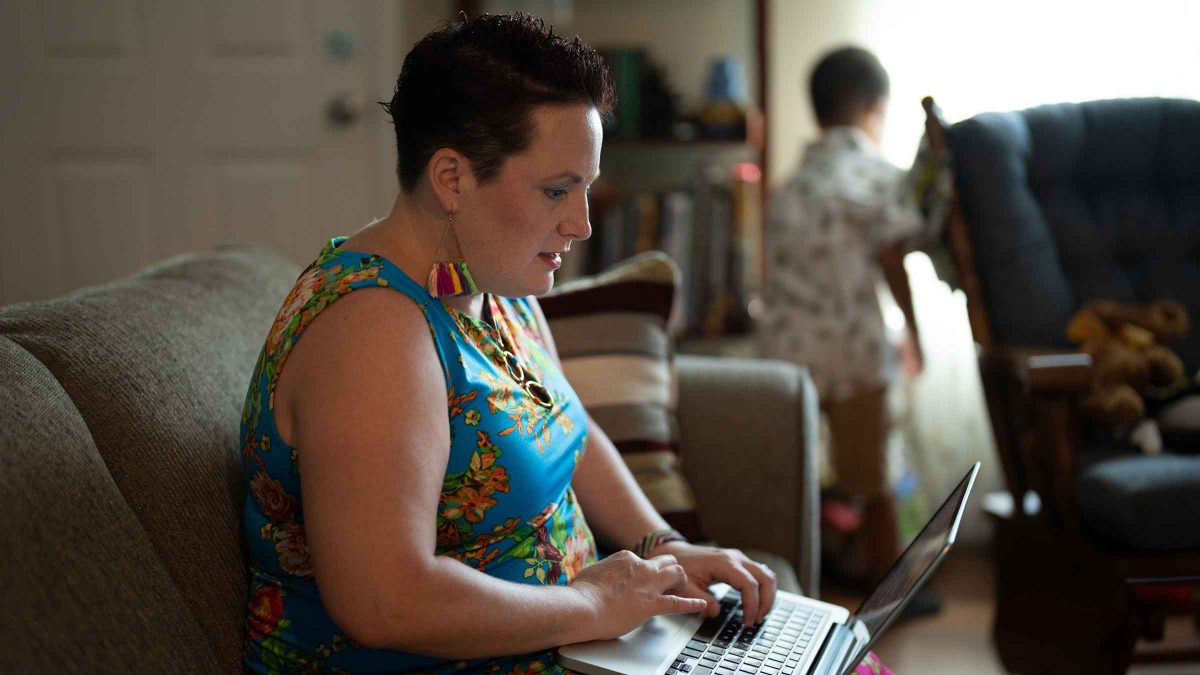How to Deal With Isolation: 8 Tips

CaringBridge Staff | 11.02.23
Isolation is an experience many of us encounter at various stages in our lives. Whether by choice or circumstance, the loneliness that often comes with isolation can make days seem longer and even make it more difficult to sleep.
For family caregivers, feelings of isolation are often magnified. The nature of caring for a loved one on a health journey demands focus and dedication that distances people from their usual social circle.
We asked the CaringBridge community to share their best advice on how to deal with isolation and loneliness as a family caregiver. Keep reading to find inspiration in their effective tips.
It’s Normal to Feel Isolated
In our interconnected world, it can seem contradictory that so many people lack human connection. But isolation is a common human experience. According to a 2023 Department of Health and Human Services study, only 39% of Americans felt very connected to others.
There are various reasons for this widespread feeling of isolation. Some people attribute it to the fast-paced nature of modern life, where genuine interactions often give way to shallow exchanges.
In addition, certain life roles, such as caregiving, can place individuals in situations where they feel separated from everyone except the person for whom they’re caring.
It’s crucial to understand that feeling isolated doesn’t reflect a personal failing or weakness. If you ever find yourself experiencing feelings of isolation, know you can get through it.
Feelings of Isolation Can Have Many Causes
Feelings of isolation can stem from many sources, including personal circumstances, societal changes or professional roles. These feelings aren’t partial to age, gender or background. They can affect anyone at any point in life. Some of the common causes include:
- Being a full-time caregiver for a loved one: This role often demands continuous attention and dedication, leaving little time for personal and social activities. The physical and emotional demands of family caregiving can lead to burnout, further exacerbating feelings of detachment from the outside world.
- Living with a loved one who is immunocompromised: Ensuring the safety and health of an immunocompromised person can lead to self-imposed isolation. Limiting exposure to potential threats often means reducing social and communal activities.
- Ongoing stress: Chronic stress, whether from work or health concerns, can lead to feeling overwhelmed. Over time, this can build mental and physical barriers between yourself and others.
Understanding these triggers can be the first step toward recognizing and addressing the feelings of isolation they create. It allows us to be compassionate toward ourselves and others.
Impacts of Isolation

Isolation is often seen as an emotional challenge. However, isolation can also impact other aspects of one’s well-being. Some of the potential impacts include:
- Physical health decline
- Mental health challenges
- Decreased self-worth
- Reduced emotional resilience
While isolation can have an impact on your physical and mental health, know that there are ways to cope. Keep reading to find eight simple yet effective tips on how to deal with isolation.
How to Deal with Isolation and Loneliness: 8 Tips
Loneliness may be common, but that doesn’t mean that it’s permanent. Here are eight tips on how to cope with feelings of isolation and loneliness as a family caregiver.
Validate Your Feelings of Loneliness
Validation is a powerful tool in dealing with loneliness. When we validate our own loneliness, we acknowledge and accept our emotions without judgment. By recognizing that feeling sad, angry or overwhelmed is perfectly normal, we grant ourselves permission to fully experience these emotions.
However, while it’s essential to validate and accept our feelings, it’s crucial to make sure this doesn’t lead to negative self-talk. It’s a delicate balance to strike. A helpful approach is acknowledging the emotion “I feel lonely” and understanding that it’s temporary. Once you understand that it’s temporary, redirect focus toward self-care activities.
Set Small, Attainable Goals
Setting small, attainable goals can provide you with hope and a welcome sense of forward movement. These micro-achievements act as stepping stones, helping individuals regain control over their lives. When we set big goals for ourselves, we run the risk of failure, resulting in discouragement.
Here are some small, attainable goal ideas someone suffering from isolation can try:
- Get dressed at least five days per week.
- Reduce your screen time by 30 minutes a day.
- Reach out to one friend or family member before the next weekend.
Find Ways to Stay Active

Staying active is an excellent remedy when you’re dealing with isolation. Physical activity, even in modest amounts, can significantly elevate your mood, reduce feelings of anxiety and boost your overall sense of well-being.
But staying active doesn’t necessarily mean committing to rigorous workout regimes or buying a gym membership. Instead, it’s about finding simple activities that keep you moving.
Starting small is the key to achieving a sustainable routine. For example, going on a 10-minute daily walk can help you feel less isolated and depressed. A yoga class is another small yet impactful way to stay active and engage in social activity.
If you don’t have the ability to sign up for an in-person yoga class, there are free options available online – YouTube is a great place to start. These follow-along videos range from a few minutes to an hour or more, and they can be a great option if you’d prefer to practice from the comfort of your own home.
“Make your body do what you need it to do for you, and go where you need to go.”
Meriam B.
Know That it Is Okay to Ask for Community Support
A sense of community can make all the difference when you’re experiencing isolation and loneliness. Humans are inherently social beings, and connecting with others provides a feeling of belonging.
Whether through family and friends or broader communities like support groups, seeking support can be a very effective way to alleviate feelings of loneliness.
Reaching out to a close friend or family member can be an initial step. You probably have a clear sense of who can provide a safe space for you, and family and friends can be more approachable if you’re wary of larger groups. On the other hand, broader communities, like support groups or community meetups, offer the advantage of diversified experiences and insights.
Rewatch Your Favorite Movies and TV Shows
In moments of isolation, familiar comforts can provide relief. Rewatching favorite movies and TV shows is similar to revisiting old friends and cherished memories.
Create a list of movies or TV shows that have brought you joy, laughter or comfort. Set aside specific times in the week dedicated to this form of self-care.
Explore Clubs that Align with Your Interests

Joining a new community can be a transformative experience, especially when feeling lonely or isolated. Clubs provide the opportunity to meet new people, and they can prompt individuals to get in touch with their interests, their values and even their identity.
There are many ways to get involved with local communities, which is especially helpful for those who have a lot on their plate. In fact, many clubs host virtual events to improve accessibility, such as online book clubs, community education classes and alumni chapters. Local community centers and social media forums (like Facebook groups) are excellent resources.
Be Mindful of Negative Self-talk
Dealing with negative self-talk when you’re going through feelings of isolation can cause people to spiral. Often subtle and internalized, negative self-talk can increase feelings of loneliness and disconnect, leading individuals to believe they’re undeserving.
Some examples of negative self-talk are:
- Magnification of undesirable events or your own perceived shortcomings
- Personalizing blame
- Anticipating the worst possible outcome
To combat negative self-talk, it’s essential to start by noticing and acknowledging when such thoughts arise. Techniques such as journaling can be valuable tools in this process.
When navigating a health journey, using an online journal can be a helpful way to process negative thoughts while connecting with others. CaringBridge, for instance, allows friends and family to write public or private posts to release their emotions with support from their community.
If you work on making your thoughts and words more positive and it feels dishonest to you, don’t give up. Instead, feel around for more subtle positive emotions that feel more authentic for you.
Speak to A Mental Health Professional
Consulting a mental health professional can be instrumental in navigating feelings of isolation. These experts have tools and insights to help individuals unpack their feelings and establish coping strategies.
For those seeking professional help, the first step is researching local mental health resources or platforms offering teletherapy. Contacting a primary care provider can also be beneficial as they can provide recommendations or referrals.
“Plant a rose, watch a funny movie, talk to a therapist regularly and visit with friends and family.”
Meriam B.
What Advice Would You Share?
When it comes to isolation, it’s important to remember that everyone’s experience is unique. By implementing various coping strategies, we can find paths to reconnect, not only with others but also with ourselves.
What would you share with those who are currently experiencing isolation and feelings of loneliness? Please share your thoughts and experiences in the comments.